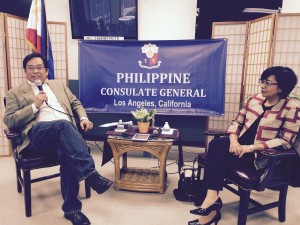Negotiator tells Fil-Ams PH must not waste real chance for peace with Moros

Consul General Leo Herrera Lim introducing Miriam Coronel-Ferrer, chief government peace negotiator at a forum in Los Angeles. PHOTOS BY DANTE OCHOA
LOS ANGELES –She’s soft-spoken, barely five feet tall and yet her words are deliberate, precise, just as one would expect from a skilled negotiator devoted to finding a peaceful agreement between the Philippine government and the Moro Islamic Liberation Front (MILF).
Professor Miriam Coronel-Ferrer, chair of the Philippine government panel (GPH) met with members of the Filipino American community and local media here Friday, April 17 at an open forum facilitated by Consul General Leo Herrera Lim on the peace negotiations with the MILF. Her message: The proposed Bangsamoro Basic Law (BBL) should not be held hostage to the Mamasapano investigations.
The framework agreement signed by the Philippine government and MILF is seen as paving the way for the creation of the Bangsamoro political entity to replace the “failed” Autonomous Region in Muslim Mindanao (ARMM).
“It will be unfortunate if this opportunity (the peace process) will slip away again,” Ferrer cautions, as she noted that so far three months worth of important work on the ground has been replaced by time spent in legislative hearings. The hearings on the BBL resumed Monday, April 20 at the Philippines’ House of Representatives.
(FLASH: Philippine Daily Inquirer learned that Ferrer is to receive on Wednesday, April 22 the prestigious Hillary Rodham Clinton Award for Advancing Women in Peace and Security in Washington D.C., along with Staffan de Mistura, the United Nations’ special envoy tasked to see a peaceful resolution to the conflict in Syria.
An official letter Ferrer reportedly received from Ambassador Melanie Verveer, executive director of the Georgetown Institute for Women, Peace and Security stated that she is receiving the award for her historic role as the first female chief negotiator to sign a comprehensive agreement.)
For many in the function room of the Philippine Consulate General, this was their first meeting with the negotiator. Miriam Coronel-Ferrer was appointed in December 2012 by President Benigno Aquino III as chair of the Government Peace Panel (for peace talks with the MILF, replacing Marvic Leonen who was appointed to the Supreme Court.
Her academic background buttresses her acquired skills and training in diplomacy; she graduated cum laude from the University of the Philippines (UP) in Diliman with a degree in philosophy in 1981. She has a master’s degree in Southeast Asian Studies from the University of Kent at Canterbury and teaches political science at the U.P. She earned a Nobel Peace Prize nomination in 2005 for her initiatives against landmines and fact-finding missions investigating human rights abuses in Cambodia and Nepal.
Iye, her nickname, was a product of the Philippines’ National Democratic Front (NDF), in a movement that started in the ‘60s, which adv0cated armed revolution to change the political and economic system of the Philippines. As a student activist in her twenties at the nation’s radical hotbed, UP, she admitted to believing in communist ideals then, smiling, “Who wouldn’t at that time?”
In 1986 she changed her perspective and adopted “peaceful means” in basically changing society. This was at the time she served as the director of the UP Third World Studies Center and was a convener of the Program for Peace, Democratization and Human Rights of the UP Center for Integrative and Development Studies, until 2005.
In March 2014, Coronel-Ferrer and the government panel that she heads negotiated and signed the Comprehensive Agreement on the Bangsamoro (CAB) with the Moro Islamic Liberation Front. The Office of the President on the Peace Process (OPAPP) takes pride that she is the first woman in the world to have signed a major peace agreement as chief negotiator.
In an interview with INQUIRER.net, she lamented that the Mamasapano incident in Maguindanao last January caused the “ceasefire to be broken.” But as she has expressed before, “the peace negotiations is not for the faint-hearted.”
In an earlier press statement she said: “As we have said many times in the past, this partnership between the GPH (Philippine government) and the MILF is also not for the impatient and the impetuous who, in the face of difficulty, immediately throw in the towel.
Coronel-Ferrer said one of the biggest impacts of the peace negotiations she heads is that “it will stop the war between government and MILF, although it will not stop all circumstances related to the decades-old conflict such as atrocities and armed group clashes by certain politicans.” She expects that 30,000 armed men to go back to normal life and be part of society.

Miriam Coronel-Ferrer is being given the prestigious Hillary Rodham Clinton Award for Advancing Women in Peace and Security.
She said that while the peace talks were mostly held in Malaysia, issues regarding both countries’ claim on Sabah were not part of the agenda.
There were six women in the Bangsamoro Peace Process including Ferrer: Secretary Teresita Quintos Deles, presidential adviser from 2003; Yasmin Busran-Lao, director Iona Jalijali; Undersecetary of National Security Council Zenaida F. Brasas; and Attorney Anna Tarhata Basman.
Coronel-Ferrer observed that anti-Muslim sentiments is deeply embedded in Philippine culture. “Vicious ang pagtingin ng ilang kababayan natin sa Muslim,” she admitted. There’s distrust, probably on both sides. “I was even accused of having an affair with a Malaysian and I received sexual insults on twitter. For the first time, someone twitted and called me a ‘dumb bitch,’ after the Mamasapano incident.”
“The biggest opportunity is the opportunity to reform the institutions that are now in place and that is, to institute an autonomous government that will be stronger and more functional,” Coronel-Ferrer explained.
She further explained that part of the goal is “to deliver good governance that will make people feel that the right to self-determination is a right that can be practiced through coexistence. And that they are also made up of different groups, different ethnicities, different political groups, men and women, and traditional leaders along with upcoming leaders” that emerged from the Moro revolutionary movement.
Hopefully, she said, a channel for peaceful competition for political power in the region could emerge, in a future where there would be “less political violence, fewer guns in the streets.”
Like us on Facebook